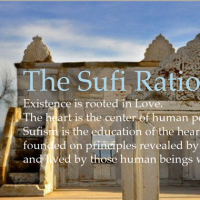 Sufism is based on certain premises that are unfamiliar, if not foreign, to our contemporary environment in which transcendent realities have been relegated so far to the background of life that they are effectively ignored:
Sufism is based on certain premises that are unfamiliar, if not foreign, to our contemporary environment in which transcendent realities have been relegated so far to the background of life that they are effectively ignored:
The first of these is the idea that the soul itself needs to be educated and trained. The soul needs knowledge and practice in the areas such as self-awareness, attention, will, relationship, service, and worship. In the modern world we don’t reflect much on the soul, let alone on its development. We may be willing to spend years and tens of thousands of dollars to receive professional training, and yet resist the idea of taking time for a weekend retreat.
The second important principle of Sufism is that this education and training is best conducted together with others—not just for the sake of convenience, but because of the opportunities to know ourselves through relationship and because of the quality of energy that is generated and shared in a group. We read the occasional book on spirituality and form our own inner convictions, but rarely commit to the ongoing process of spiritual education and transformation.
The third principle is that there are people who have experience and knowledge in this area, and who may be empowered through a spiritual lineage to provide wisdom, guidance, and inspiration. We resist the idea of such a relationship because relationships demand something of us: honesty, commitment, change. Even if we consider ourselves on a spiritual path, we would rather commit to a technique, such as meditation, which preserves our imagined autonomy and freedom, rather than to a relationship and a spiritual family.
Of course, there are many good reasons why we should be skeptical about people who set themselves up as spiritual teachers and groups that proselytize or seek to enlist members. The real spiritual paths may seek to offer knowledge to the societies in which they exist, yet, because they trust in a greater guidance, they never seek members merely to increase their numbers. In fact it has been a conscious principle that the path exists to serve those who choose it, although this was in societies with enough general education to know the purpose of the “tariqa,” or path.
Because spiritual transformation is not a form of conditioning, it cannot be accomplished only through the sharing of information and techniques. The spiritual dimension of it is more mysterious, more creative, more unpredictable. No matter what kind of training program is devised, it can never guarantee that its graduates will have attained freedom from the self, love of other human beings, and sincere love of God. And yet this is what Sufi education aims at.
Finally, there is the question of Sufism’s relation to religion in general, and Islam in particular. The Sufi who has attained some maturity belongs to all of humanity. His or her wish is to see any individual attain the highest level of human completion that is possible for them, and realizes that the question of belief and religious affiliation is between each person and their God.
The Sufi teacher looks to the spiritual realization of human beings, not to any nominal adherence to belief. If the Sufi loves the heritage of classical heritage of Sufism, it is because of the richness the tradition offers, because of the inspiration, purity, and practicality of its message. Those who are uneasy about the relationship of Sufism to Islam are usually people who are relatively uninformed about what traditional Islam represents. We need to look beyond the distorted image of Islam that is common in the West to the real Islam, the Islam of Muhammad and the Qur’an, and the Islam of classical Sufism. The more one looks to this essential Islam, the more clear it will become how close are the qualities that we admire in Sufism and the essence of the Qur’an and the character of Muhammad. The humanness of Sufism, the degree of its wholeness, its integration with ordinary life, its nobility, liberality, and humility are almost inconceivable without the revelation of the Qur’an and the personality of Muhammad. In fact to the extent that various modern Sufi adaptations distance themselves from classical Islamic Sufism, the more they seem to become fragments of a wholeness. In some cases Sufism is reduced to the search for ecstasy; in others it is reduced to a dry epistemology. In still other cases, it becomes religious fanaticism; and in others a kind of free-spirited mystical sensuality. But Sufism, at its best, is a path of completion. It proceeds from the living example of human completion and leads toward that completion.

